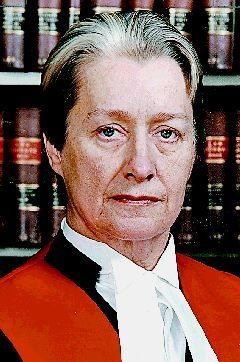Journal Entry- Role Models
The issue of public figures being role models is not new - athletes like Charles Barkley addressed this issue years ago in a newsmaking commercial titled, "I am not a role model". To further elaborate the point, Barkley said, "Professional athletes should not be role models. Hell, I know drug dealers who can dunk. Can drug dealers be role models too?"

Mr. Barkley's more infamous acts include numerous barroom brawls, and spitting on a 6 year old girl at a game. His excuse? He meant to spit on the man behind her.

Along a similar vein, Barkley offered this insight when discussing a new
edition of his sponsored shoe,
"These are my new shoes. They're good shoes. They won't make you
rich like me, they won't make you rebound like me, they definitely won't
make you handsome like me. They'll only make you have shoes like me. That's
it."
So it's pretty clear where "Sir Charles" lies on this topic.
However, three news stories from spring 2003 have brought this issue to
question in a different, but equally public environment.

* (Now former) Nova Scotia Minister of Health Jane Purves, when asked if a smoker should be Minister of Health, stated that she didn't feel she had to be a role model.

* Premier of British Columbia Gordon Campbell, while on vacation in Hawaii, was arrested for drunk driving, with a blood alcohol count of .149. The legal limit in Hawaii, BC (and Nova Scotia) is 0.08.

While expressing regret for this incident, Mr. Campbell insisted that he won't resign from governing the province, because the offence occurred while on a private, not government sponsored, trip.

· When confronted with municipal smoking laws in Vancouver British Columbia, BC Court of Appeal Justice Mary Southin threatened to quit her job if she wasn't allowed to smoke in her office instead of going outside to smoke like everybody else. The result? A $19,000 renovation to her chambers so she can smoke there.
All of these people are in the public eye, and essentially get paid because of us - the fan (in Barkley's case) or the taxpayer, in the case of the government officials. This ultimately poses the question:
In return, do these people owe it to us to be role models?
Do you find it unacceptable that the Minister of Health engages in a habit that is known to damage the health of the smoker and anyone around her?
Do you find it unacceptable that the Premier of British Columbia maintains a position of power (including making laws about drunk drivers) while he himself drove drunk?
Do you find it acceptable that a judge, a person trusted to uphold the laws of the land, is not only allowed to break the law but is assisted by the government in doing so?
For many people the answer is a resounding NO. It is interesting to note, however, that not everyone agrees. Some argue that personal habits are just that - personal. If the person still does the job well, they should be entitled to do the job. Some would even say that a person with another perspective even adds to the position - for example, Jane Purves can take into consideration the difficult nature of nicotine addiction when contributing to new laws. Perhaps a more sympathetic Minister would offer the suggestion of assistance programs to help people quit, instead of simply pushing them outdoors, next to dangerous highways.
In the end, there are people out there who are willing to overlook personal shortcomings if the people can still do an excellent job.
The question is, are you?
Your challenge
is to write a FULL PAGE, SINGLE SPACED reflection on the issue of public
figures. Should public figures be held up to greater expectations than
others? Why or why not? When answering this question, feel free to use
whatever combination of examples you choose: government officials, teachers,
parents, athletes, musicians and actors are all people we tend to expect
a little more from - are we entitled to it?